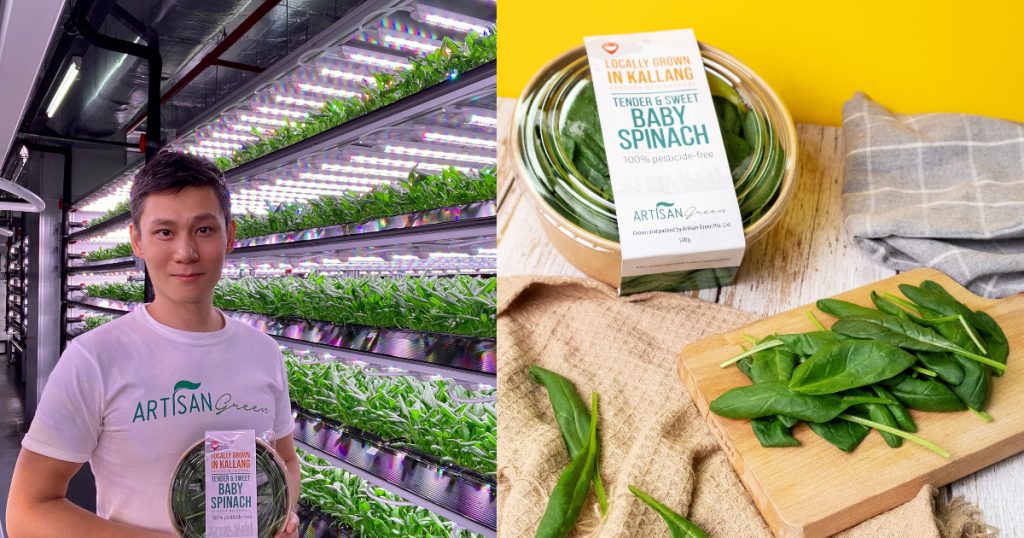Artisan Green is recognised as one of Singapore’s leading indoor hydroponics farms, which is also the top supplier of locally-grown baby spinach.
Combining Artificial Intelligence (AI), automation, and machine learning, the only manpower it utilises comprises farming experts and horticulturists.
However, the founder of Artisan Green’s background is a far cry from agritech. Right after graduating from The University of Melbourne in 2009 with a degree majoring in economics and finance, Ray Poh jumped into the casino gaming industry.
Based out of Macau from 2010 to 2016, Ray worked in both a casino gaming manufacturing company — Weike Gaming Technology — that produces slot machines, electronic gaming tables and systems, as well as in a casino operations company.
A modern-day farmer
Ray spent most of his years in Melbourne prior to working out of Macau. After spending almost 15 years overseas, he yearned for time spent with his family and friends in Singapore.
When he was back in Singapore, he decided to research industries outside of gaming, with a focus on green and sustainable industries.
He knew he wanted to pursue something that was forward-looking, and would allow him to contribute meaningfully to the economy. It pushed him to research more on farming; in particular hydroponics and vertical farming.
Growing up in Singapore, farming is one of the furthest occupations from everyone’s minds. The possibility of bringing modern technology into the agriculture sector was something that piqued my interest.
– Ray Poh, founder of Artisan Green
He was inspired by how Singapore secured the nation’s water supply with its four national taps, adn this pushed him to brainstorm ideas on how to contribute to the nation’s food security.
Ray continued his deep dive into agriculture as a whole, attended courses, and built prototypes to grow produce. Through his own experimentation, he saw how food was grown from seed-to-table, and it motivated him to switch industries.
From seed to table
Located in Kallang, the indoor hydroponics farm specialises in baby leaf and herb production using Controlled Environment Agriculture techniques.
Presently, its baby leaf produce range includes its flagship product baby spinach, red baby kale, and a salad mix called Kallang Raw. Meanwhile, its herb range includes basil, chives, coriander, dill, mint, parsley, rosemary, and thyme.

The entire process from seed-to-table takes about three weeks.
It begins with procuring and testing of seed cultivars and finding out which one yields the best taste and yield for the operation.
Following which, they sow the seeds in their growth trays and germinate them for up to a week depending on the crop type. The seedlings are then left to grow for almost three weeks before running them through the harvesting machine.
Finally, the team sorts out the produce and packs them in their retail packaging, ready to be delivered to their customers.
However, coming from a non-agricultural background, Ray encountered many who doubted his ability to execute the building and operations of a farm.
Some suppliers would not entertain our team due to our farm’s infancy. We had to source widely to find our supplies. We also faced scaling issues when we began as I only had experience in growing produce in a small prototype system. Thus, we had to work out operational kinks in the first year.
– Ray Poh, founder of Artisan Green

Additionally, most farming machines were intended for larger-scale farms and were either too large or expensive for a small-scale operation. As such, Ray and his team had to think out of the box and source for machines in alternate industries to find something suited for their farm.
Melding machine learning with traditional techniques
Since Artisan’s inception, Ray and his team have been collating data in order to make sound decisions for the farm.
At a colleague’s suggestion, Ray applied AI to improve on their decision-making process. However, even with sufficient data, the process wasn’t fast enough to handle real-time situations.
A host of parameters go into growing plants. These include climate conditions such as temperature, wind speed, humidity and volatile organic compounds (VOC), as well as nutrient profiles — there are varying amounts of individual compounds that make up a nutrient solution.
Due to the amount of parameters, he and his team were looking at a multivariate problem that isn’t single-handedly solvable. To address the issue, Ray is working on creating a digital twin of a plant with a stored database of parameters.
This allows us to build a virtual farm to simulate the plants’ reactions to the different climate environment and nutrient formula that we can input into the model.
Coupled with the in-house precision nutrient injector that we developed, we’re also able to control the nutrient profiles at a per growth bed level on demand. Hence, we can look at the life cycle of the plant at a higher level of precision and create models of plants within our virtual farm.
– Ray Poh, founder of Artisan Green

The overall process is highly sustainable, since precision dosing only disperses what crops need. It also reduces fertiliser waste by 50 per cent and water usage by 90 per cent.
Combining the use of vertical farming techniques with a digital farming operating system is an ideal integration of science, engineering, and commercial viability — this is something Ray thinks the agritech industry has yet to achieve.
To ensure the technology is well-maintained, Ray and his team also track all their equipment and plan ahead for any possibility of machine failure.
They conduct regular maintenance and also make sure that they have spare parts on hand. Automation of the processes also safeguards against minimal mistakes that can occur due to human error.
Success measured in partnerships
According to Ray, he has invested a six-figure sum into the farm so far. Majority of the funds have been invested into R&D, especially since it is the core pillar of the business.
Taking into account pure farm operational expenses without the R&D, Ray said that they managed to break even in early 2022. He adds that their revenue has grown more than tenfold since 2018, and that they are now supplying to over 50 stores, including Fairprice Finest, Little Farms and RedMart.
We’ve also been sought out to consult for other farms due to the difficulties behind growing baby spinach indoors. Having such large international farms seek us out validates our scientific approach to farming, and reflects on our team’s expertise and hard work in this nascent industry.
– Ray Poh, founder of Artisan Green

To ensure that the business is profitable and sustainable, Ray said that it’s necessary for him to understand the ins and outs of running a farming operation, as well as how to grow their sales channels.
One of the biggest partnerships for Artisan has been NTUC Fairprice Finest. Ray and his team had approached them with samples for their committee to conduct a tasting session.
“Once we were onboard, we sold out weekly. Customers realised the difference in our fresh product as compared to imports,” he shares.
Onward to greener pastures
The growth of the business soon saw farm produce demand exceeding its supply. Currently, they’re in the midst of raising funds to build a new 5,400 metre-square farm by the end of 2022.
The new farm will be almost a 20-fold increase of Artisan’s current farm’s production capacity. Additionally, it will comprise full automation to increase productivity.
Ray and his team have also developed their own proprietary hardware to be integrated into their farming software operating system. This scalable and deployable technology will bring the farm further into the digital age.
Artisan also has plans to deploy its systems in greenhouses to be able to grow local vegetables for the mass market at an affordable price.
Our current focus is the regional market in Asia for the near term, as it is closer to home and easier for us to assess the viability of the farm. However, this does not preclude the option of expanding to other parts of the world.
We also intend to work on collaborations with other international partners in order to build more farms and also supply our technology to the world in future.
– Ray Poh, founder of Artisan Green
Despite his many business development plans, Ray acknowledges that local farms alone may not be able to produce for the entirety of consumption in Singapore.
“With many regulations governing the usage of land, finding a suitable site can be a challenge as one would have to navigate the rules set out by different government agencies. Therefore, being able to operate a large-scale farm can be a difficult and time-consuming undertaking even before construction occurs.”
However, he adds that it is still necessary for Singapore to be able to play a big part in contributing to a significant percentage of food supply. This is essential to mitigate any shortfall in supply from other countries.
Featured Image Credit: Artisan Green
Read More: Farm to table: This S’pore startup digitises agricultural supply chain to benefit F&B players










